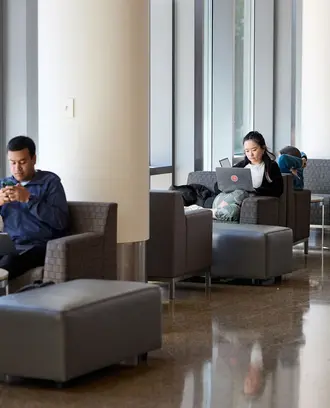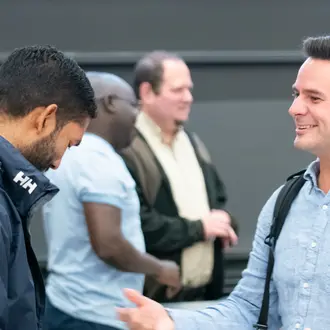Sebastián Castañeda Arbeláez
An old New Yorker cartoon features a man sitting at a desk in his home office. He turns to his wife with evident angst and posits, “I can’t remember, do I work at home or live at work?” It is this conundrum that worries Sebastián Castañeda Arbeláez, SF ’14, Corporate Manager of Financial Planning and Business Performance at Ecopetrol in Colombia—one of the largest oil and gas companies in Latin America. Are employees actually losing personal/professional balance in working from home? Castañeda is determined to make sure they don’t. At first, the pandemic-driven changes sent managers at Ecopetrol reeling. “Ours is a traditional company that has always been run according to a traditional model,” says Castañeda. “Everybody showed up for work in office buildings, at refineries, and at oil fields, so having to send thousands of people home to work remotely was almost unimaginable.”
The company’s enduring credo “life and safety first,” however, guided managers and canceled out fears around reduced efficiency. Anyone who could function from home was sent home, and the workforce at refineries and oil fields was reduced to enable physical distancing.
Overworking from home
But what happened next surprised everybody. Instead of slacking off, employees overcompensated to make sure productivity was not lost. It became difficult, Castañeda says, to separate work from family life. “When you go to an office on a regular schedule, it’s easier to draw a line. I used to turn off work at 7 PM on the dot. But during quarantine, parents were helping children study remotely during the day while still trying to hold meetings and deliver work. They could feel the unread emails calling to them from across the room as they ate dinner with their families. In the end, they were working much longer hours.”
Ecopetrol human resources managers were growing concerned about work/life balance. Managers checked in with employees during virtual meetings to make sure they were handling the transition without too much stress, and the company ran surveys about remote working to take the temperature of the workforce as a whole. The results indicated what managers feared—increased stress at trying to juggle personal and professional responsibilities.
Immediately, Ecopetrol implemented new policies. “The objective is to avoid burnout from back-to-back meetings,” Castañeda says. “The new policy is that meetings must be scheduled between 8 a.m. to 5 p.m. with 12 p.m. to 2 p.m. set aside for lunch and family time. Having that bit of time in the afternoon gives people a chance to catch their breath and recharge. We also are freeing up Friday afternoons for online social activities, so that employees can connect with their teammates on a personal level to celebrate birthdays or commiserate about remote-schooling—no business activities allowed. Friday afternoons are a bonding time, a chance to make up some of the coffee-break conversation that is missing from the remote environment. Managers also are trying to minimize emails or phone calls outside the traditional work schedule to respect employees’ personal time.”
More human-focused policies
Ecopetrol also has relaxed its vacation policy so that employees can take time off in more flexible installments and whenever they need a break from the virtual rat race.
“We are going to great lengths to safeguard salaries, benefits, and jobs,” Castañeda adds. “In a country like Colombia, where many people don’t have fixed salaries, our employees really appreciate their jobs—and they value an employer that is always taking their well-being into consideration. They are dedicated to their jobs and don’t want to let the company down, especially in the middle of a crisis. Unfortunately, always working in high gear is not sustainable. While we want productive employees, we also want healthy employees.”
Castañeda believes the spotlight on the balance of the personal and professional has heightened awareness about broader human resource issues like diversity policies, training, and competence for dealing with this new reality. “This pandemic has caused companies like ours to rethink our policies and consider more flexible, human-centered approaches going forward. It is creating new conversations about the future of work, the key role of technology, and how to manage a more diverse and remote workforce with a focus on flexibility and sustainability. We know that by protecting employees, everyone is better off. If an organization’s only goals are financial, I think they’ll find they have a much less invested workforce.”



